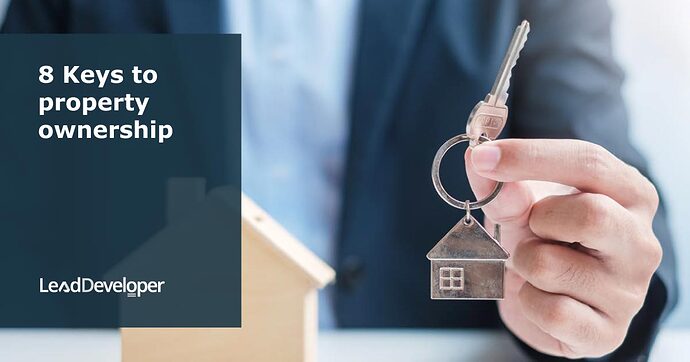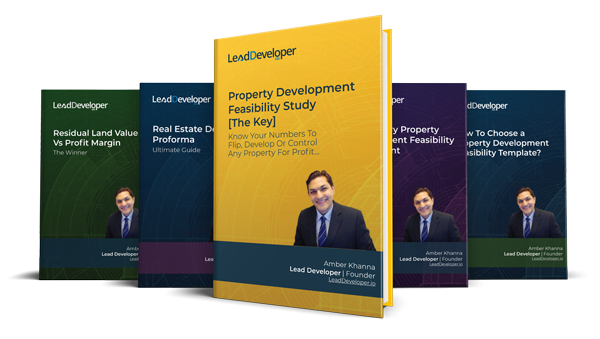Continued from…
8 Keys to property ownership [Part 1-2]
Type 6 - Leasehold title
A leasehold title is a property ownership structure where the owner of a property (the “lessor”) leases it to another person (the “lessee”) for a set amount of time.
The lessee has exclusive use of the property during the lease term and typically has the right to renew the lease at the end of each term.
Leasehold titles are most commonly used for residential properties, although you can also use them for commercial properties.
Under a leasehold title arrangement, the lessor retains ownership of the property (and all associated rights and liabilities). At the same time, the lessee gains exclusive use and control over it for the duration of the lease.
You are missing out if you haven’t yet subscribed to our YouTube channel.
Type 7 - Commonhold lease
Commonhold lease is a new type of property ownership available in some states. The commonhold association owns the common areas, and all the owners share in the upkeep and maintenance of the property.
Commonhold is a new property title introduced in England and Wales in 2004. It was designed to offer an alternative to leasehold ownership, which has a number of disadvantages.
The key benefits of commonhold are that it gives each owner a share in the management company which owns the land on which the property is built and that it makes it much easier to sell or mortgage your property.
Less common property title
Each state may contain uncommon or out-of-date titles that you have never heard of, including “pastoral title” or “native title.”
It is crucial to understand the title deeds of a property before moving forward since it will provide you with a list of questions to make to the selling agent, including:
- Do you and your neighbors still have any unresolved fencing issues?
- Do you have any knowledge of any easements on the land?
- What are the community title contributions and corporate body levies?
- How are the common areas maintained?
- Does the owners’ corporation currently have any conflicts?
- Can this freehold property be divided? (Ask this if you’ve discovered a sizable block that you might want to develop in the future.)
- Can I convert this house to two occupancies? (Or, add a second home without splitting it.)
- Does this title have any active covenants? (That is, limitations on what can be erected, the color of the roof, and other things.)
- Does this title have any caveats (sale restrictions)?
Again, the property agent might not be familiar with these responses, so email a list and request that they respond to you within a day or two.
Property Development Feasibility Study Bundle
Includes 5 x detailed eBooks (193 pages)
✓ Property Development Feasibility Study [THE KEY] - (45 pages)
✓ Real Estate Development ProForma - Ultimate Guide - (39 pages)
✓ Residual Value Of Land Vs Profit Margin - The Winner - (24 pages)
✓ Preliminary Development Feasibility Assessment - (35 pages)
✓ How To Choose a Property Development Feasibility Template? - (50 pages)
Final words
Each real estate investment or portfolio has a unique life cycle. The property has been purchased, is owned, maintained, and has specific planned outcomes.
Property owners need to consider both public and private constraints. Purchasing real estate and maximizing its use and disposal will take place within the framework of such limitations.
Public and private restrictions are both dynamic. Relationship management with external forces imposing such limits may be necessary for property management.
The most obvious alternative for an ultimate goal for a particular property is a “buy and hold” plan that lasts forever. The physical deterioration component of real estate contradicts a pure “buy and hold” strategy in most situations, and real estate requires ongoing care and attention.
FAQs
What would happen if I changed my type of property title?
There are a few things that could happen if you changed your type of property title. For one, the government could seize your property for not adhering to the correct title type. Additionally, if you have a loan on your property, the lender may insist that you switch back to the original title in order to continue receiving mortgage payments.
Finally, if you decide to sell your property after switching titles, it may be more difficult to find a buyer who is comfortable with the change.
What is the difference between ownership and title?
There’s a big difference between ownership and title. Ownership is having full control and dominion over something, while title is simply having a document that says you are the owner.
So, for example, if you buy a car, you become the owner of the car, but you may not have the title to it (i.e., the document that proves you are the owner). Similarly, if someone gives you their car as a gift, you become the owner of the car but may not have the title to it.
What are the essential elements of property ownership?
The essential elements of property ownership are that you have the exclusive right to use and enjoy the property, and that you can exclude others from using and enjoying it.
You also need to own the property outright - you can’t just lease it or borrow it from someone else - and you need to have a clear title to it, meaning there can’t be any liens or other legal encumbrances on the property that would prevent you from owning it.
What are the various modes of acquiring ownership?
Generally, ownership can be classified into two types: sole ownership and co-ownership. Sole ownership is where an individual has complete control over the property. Co-ownership, on the other hand, is when two or more people share control over the asset.
The most common type of co-ownership is joint tenancy, which is typically seen in close relationships like marriages or partnerships. Other forms of co-ownership include tenancy in common and community property.
There are several ways to acquire ownership of property. The most common method is through purchase— exchange of money or other value for the asset. This can be done through a private sale between two individuals or through a larger transaction like a real estate auction.
Property Finance Made Easy
We specialise in Development funding | Commercial finance | Construction loans | Portfolio refinancing & Property investment loans in Australia.
Click Here to strategise with Amber






